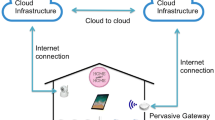Abstract
Ubiquitous computing allows application developers to build a large and complex distributed system that can transform physical spaces into computationally active and intelligent environments. Ubiquitous applications need a middleware that can detect and act upon any context changes created by the result of any interactions between users, applications, and surrounding computing environment for applications without users’ interventions. The context-awareness has become the one of core technologies for application services in ubiquitous computing environment and been considered as the indispensable function for ubiquitous computing applications. The need for high quality context management is evident to the component-based middleware for it forms the basis of the component adaptation and the component deployment in the pervasive computing. Therefore, we suggest a holistic approach where context management is an integral part of a more comprehensive adaptation enabling middleware, thus enabling the development and support of context-aware, component-based applications.
This work was funded by the National Grand Fundamental Research 973 Program of China under Grant No.2005cb321804, the National High-Tech Research and Development Plan of China under Grant No.2004AA112020.
Preview
Unable to display preview. Download preview PDF.
Similar content being viewed by others
References
Weiser, M.: Some computer science problems in ubiquitous computing, Communications of the ACM (July 1993)
Roy, W., Trevor, P.: System Challenges for Ubiquitous & Pervasive Computing. In: Proceedings of the 27th International Conference on Software Engineering (May 2005)
Dey, A.K.: Understanding and Using Context. Personal and Ubiquitous Computing Journal 5, 4–7 (2001)
Microsoft Corporation, An Introduction to Microsoft.NET, White Paper (2001)
Sun Microsystems. Entreprise JavaBeans Specification 2.0 (2002)
OMG CORBA Components Version 3.0, An adopted Specification of the Object Management Group (June 2002)
OMG. Specification for Deployment and Configuration of Component Based Distributed Applications (March 2003)
IST. COACH WP2: Specification of the Deployment and Configuration, D2.4 (July 2003)
Dey, A.: Providing Architectural Support for Building Context-Aware Applications, Ph.D. Thesis Dissertation, College of Computing, Georgia Tech (December 2000)
Dey, A., Abowd, G.D.: Towards a Better Understanding of Context and Context Awareness. Technical Report, GITGVU-99-22, Georgia Institute of Technology (1999)
Schmidt, A.: Ubiquitous Computing- Computing in Context, Ph.D. Thesis, Lancaster University, UK (2002)
Chen, G., Kotz, K.: A survey of context-aware mobile computing research. Department of Computer Science, Dartmouth College, Dartmouth, Technical report TR2000-381 (2000)
CORBA Components Version 3.0:An adopted Specification of the Object Management Group, OMG (June 2002)
Bruneton, T.C.E., Stefani, J.: The fractal component model (2004)
OMG, Specification for Deployment and Configuration of Component Based Distributed Applications (March 2003)
Information technology - open distributed computing - odp trading function, ISO/IEC JTC1/SC21.59 Draft, ITU-TS-SG 7 Q16 report (November 1993)
Mikalsen, M., Floch, J., Paspallis, N., Papadopoulos, G.A., Ruiz, P.A.: Putting Context in Context: The Role and Design of Context Management in a Mobility and Adaptation Enabling Middleware. In: MDM 2006 (2006)
Ayed, D., Taconet, C., Bernard, G., Berbers, Y.: An Adaptation Methodology for the Deployment of Mobile Component-based Applications. IEEE Computer Society Press, Los Alamitos (2006)
Author information
Authors and Affiliations
Editor information
Rights and permissions
Copyright information
© 2007 Springer-Verlag Berlin Heidelberg
About this paper
Cite this paper
Zheng, D., Jia, Y., Zhou, P., Han, WH. (2007). Context-Aware Middleware Support for Component Based Applications in Pervasive Computing. In: Xu, M., Zhan, Y., Cao, J., Liu, Y. (eds) Advanced Parallel Processing Technologies. APPT 2007. Lecture Notes in Computer Science, vol 4847. Springer, Berlin, Heidelberg. https://doi.org/10.1007/978-3-540-76837-1_20
Download citation
DOI: https://doi.org/10.1007/978-3-540-76837-1_20
Publisher Name: Springer, Berlin, Heidelberg
Print ISBN: 978-3-540-76836-4
Online ISBN: 978-3-540-76837-1
eBook Packages: Computer ScienceComputer Science (R0)




